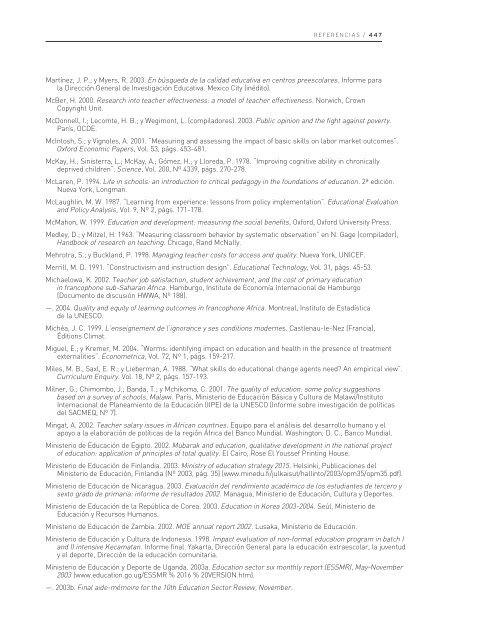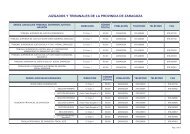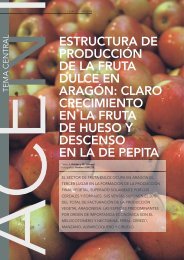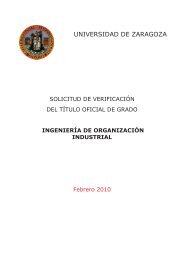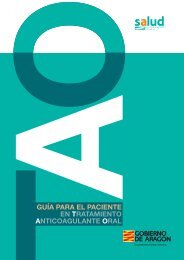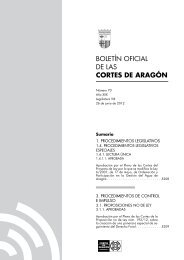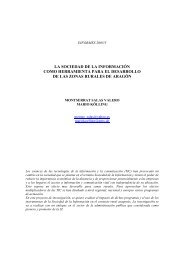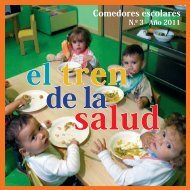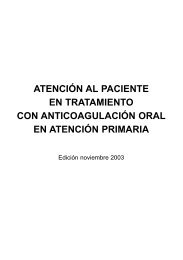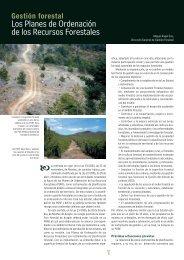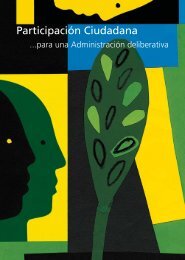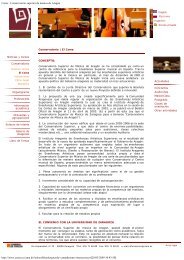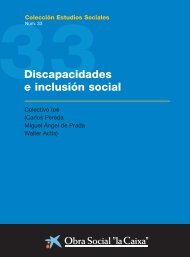Educación para todos: el imperativo de la calidad - unesdoc - Unesco
Educación para todos: el imperativo de la calidad - unesdoc - Unesco
Educación para todos: el imperativo de la calidad - unesdoc - Unesco
You also want an ePaper? Increase the reach of your titles
YUMPU automatically turns print PDFs into web optimized ePapers that Google loves.
REFERENCIAS / 447<br />
Martínez, J. P.; y Myers, R. 2003. En búsqueda <strong>de</strong> <strong>la</strong> <strong>calidad</strong> educativa en centros preesco<strong>la</strong>res. Informe <strong>para</strong><br />
<strong>la</strong> Dirección General <strong>de</strong> Investigación Educativa. Mexico City (inédito).<br />
McBer, H. 2000. Research into teacher effectiveness: a mod<strong>el</strong> of teacher effectiveness. Norwich, Crown<br />
Copyright Unit.<br />
McDonn<strong>el</strong>l, I.; Lecomte, H. B.; y Wegimont, L. (compi<strong>la</strong>dores). 2003. Public opinion and the fight against poverty.<br />
París, OCDE.<br />
McIntosh, S.; y Vignoles, A. 2001. “Measuring and assessing the impact of basic skills on <strong>la</strong>bor market outcomes”.<br />
Oxford Economic Papers, Vol. 53, págs. 453-481.<br />
McKay, H.; Sinisterra, L.; McKay, A.; Gómez, H.; y Lloreda, P. 1978. “Improving cognitive ability in chronically<br />
<strong>de</strong>prived children”. Science, Vol. 200, Nº 4339, págs. 270-278.<br />
McLaren, P. 1994. Life in schools: an introduction to critical pedagogy in the foundations of education. 2ª edición.<br />
Nueva York, Longman.<br />
McLaughlin, M. W. 1987. “Learning from experience: lessons from policy implementation”. Educational Evaluation<br />
and Policy Analysis, Vol. 9, Nº 2, págs. 171-178.<br />
McMahon, W. 1999. Education and <strong>de</strong>v<strong>el</strong>opment: measuring the social benefits, Oxford, Oxford University Press.<br />
Medley, D.; y Mitz<strong>el</strong>, H. 1963. “Measuring c<strong>la</strong>ssroom behavior by systematic observation” en N. Gage (compi<strong>la</strong>dor),<br />
Handbook of research on teaching. Chicago, Rand McNally.<br />
Mehrotra, S.; y Buck<strong>la</strong>nd, P. 1998. Managing teacher costs for access and quality. Nueva York, UNICEF.<br />
Merrill, M. D. 1991. “Constructivism and instruction <strong>de</strong>sign”. Educational Technology, Vol. 31, págs. 45-53.<br />
Micha<strong>el</strong>owa, K. 2002. Teacher job satisfaction, stu<strong>de</strong>nt achievement, and the cost of primary education<br />
in francophone sub-Saharan Africa. Hamburgo, Institute <strong>de</strong> Economía Internacional <strong>de</strong> Hamburgo<br />
(Documento <strong>de</strong> discusión HWWA, Nº 188).<br />
—. 2004. Quality and equity of learning outcomes in francophone Africa. Montreal, Instituto <strong>de</strong> Estadística<br />
<strong>de</strong> <strong>la</strong> UNESCO.<br />
Michéa, J. C. 1999. L’enseignement <strong>de</strong> l’ignorance y ses conditions mo<strong>de</strong>rnes. Castlenau-le-Nez (Francia),<br />
Éditions Climat.<br />
Migu<strong>el</strong>, E.; y Kremer, M. 2004. “Worms: i<strong>de</strong>ntifying impact on education and health in the presence of treatment<br />
externalities”. Econometrica, Vol. 72, Nº 1, págs. 159-217.<br />
Miles, M. B., Saxl, E. R.; y Lieberman, A. 1988. “What skills do educational change agents need An empirical view”.<br />
Curriculum Enquiry. Vol. 18, Nº 2, págs. 157-193.<br />
Milner, G.; Chimombo, J.; Banda, T.; y Mchikoma, C. 2001. The quality of education: some policy suggestions<br />
based on a survey of schools, Ma<strong>la</strong>wi. París, Ministerio <strong>de</strong> <strong>Educación</strong> Básica y Cultura <strong>de</strong> Ma<strong>la</strong>wi/Instituto<br />
Internacional <strong>de</strong> P<strong>la</strong>neamiento <strong>de</strong> <strong>la</strong> <strong>Educación</strong> (IIPE) <strong>de</strong> <strong>la</strong> UNESCO (Informe sobre investigación <strong>de</strong> políticas<br />
d<strong>el</strong> SACMEQ, Nº 7).<br />
Mingat, A. 2002. Teacher sa<strong>la</strong>ry issues in African countries. Equipo <strong>para</strong> <strong>el</strong> análisis d<strong>el</strong> <strong>de</strong>sarrollo humano y <strong>el</strong><br />
apoyo a <strong>la</strong> <strong>el</strong>aboración <strong>de</strong> políticas <strong>de</strong> <strong>la</strong> región África d<strong>el</strong> Banco Mundial. Washington, D. C., Banco Mundial.<br />
Ministerio <strong>de</strong> <strong>Educación</strong> <strong>de</strong> Egipto. 2002. Mubarak and education, qualitative <strong>de</strong>v<strong>el</strong>opment in the national project<br />
of education: application of principles of total quality. El Cairo, Rose El Youssef Printing House.<br />
Ministerio <strong>de</strong> <strong>Educación</strong> <strong>de</strong> Fin<strong>la</strong>ndia. 2003. Ministry of education strategy 2015. H<strong>el</strong>sinki, Publicaciones d<strong>el</strong><br />
Ministerio <strong>de</strong> <strong>Educación</strong>, Fin<strong>la</strong>ndia (Nº 2003, pág. 35) (www.minedu.fi/julkaisut/hallinto/2003/opm35/opm35.pdf).<br />
Ministerio <strong>de</strong> <strong>Educación</strong> <strong>de</strong> Nicaragua. 2003. Evaluación d<strong>el</strong> rendimiento académico <strong>de</strong> los estudiantes <strong>de</strong> tercero y<br />
sexto grado <strong>de</strong> primaria: informe <strong>de</strong> resultados 2002. Managua, Ministerio <strong>de</strong> <strong>Educación</strong>, Cultura y Deportes.<br />
Ministerio <strong>de</strong> <strong>Educación</strong> <strong>de</strong> <strong>la</strong> República <strong>de</strong> Corea. 2003. Education in Korea 2003-2004. Seúl, Ministerio <strong>de</strong><br />
<strong>Educación</strong> y Recursos Humanos.<br />
Ministerio <strong>de</strong> <strong>Educación</strong> <strong>de</strong> Zambia. 2002. MOE annual report 2002. Lusaka, Ministerio <strong>de</strong> <strong>Educación</strong>.<br />
Ministerio <strong>de</strong> <strong>Educación</strong> y Cultura <strong>de</strong> Indonesia. 1998. Impact evaluation of non-formal education program in batch I<br />
and II intensive Kecamatan. Informe final. Yakarta, Dirección General <strong>para</strong> <strong>la</strong> educación extraesco<strong>la</strong>r, <strong>la</strong> juventud<br />
y <strong>el</strong> <strong>de</strong>porte, Dirección <strong>de</strong> <strong>la</strong> educación comunitaria.<br />
Ministerio <strong>de</strong> <strong>Educación</strong> y Deporte <strong>de</strong> Uganda. 2003a. Education sector six monthly report (ESSMR), May-November<br />
2003 (www.education.go.ug/ESSMR % 2016 % 20VERSION.htm).<br />
—. 2003b. Final ai<strong>de</strong>-mémoire for the 10th Education Sector Review, November.


